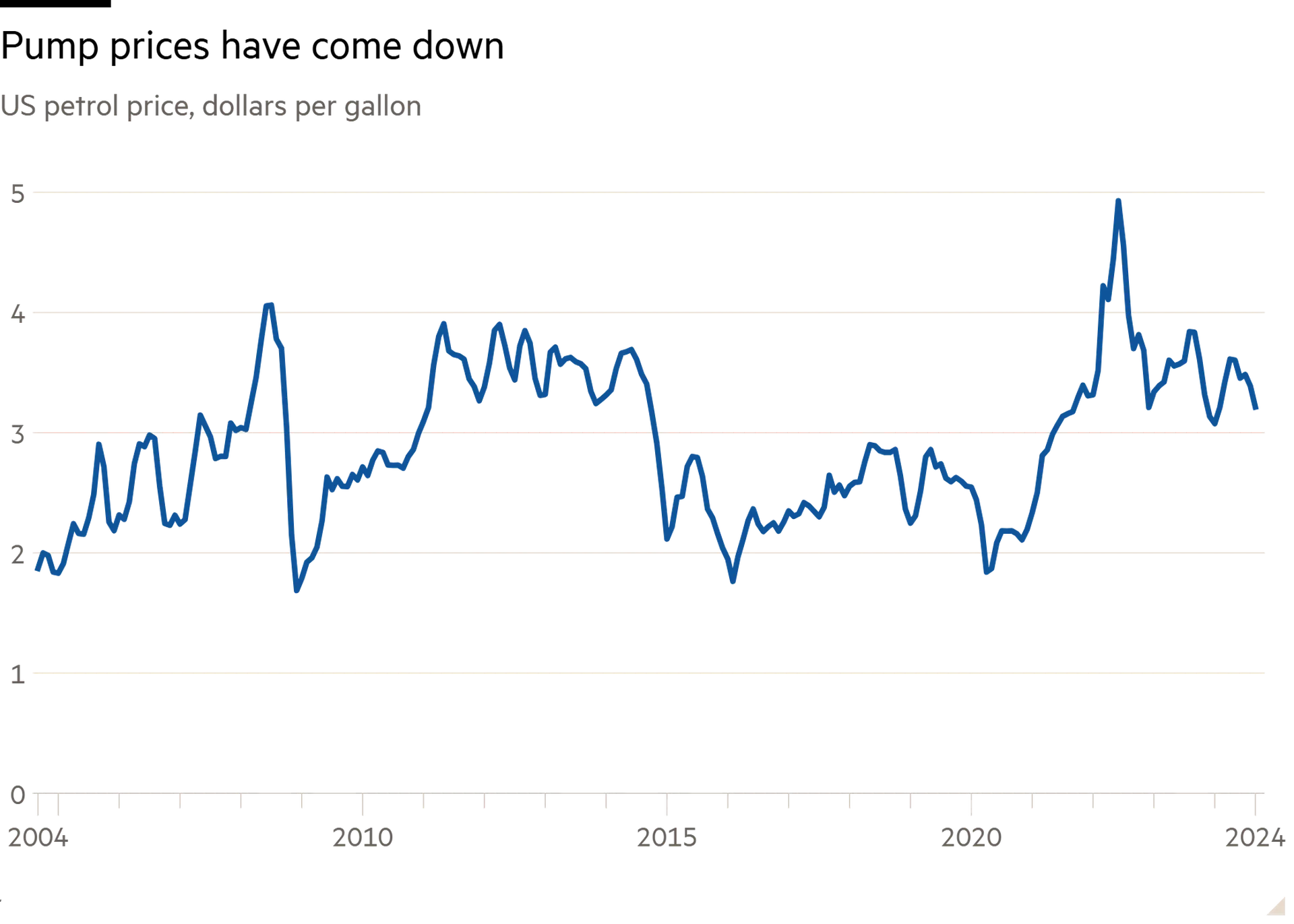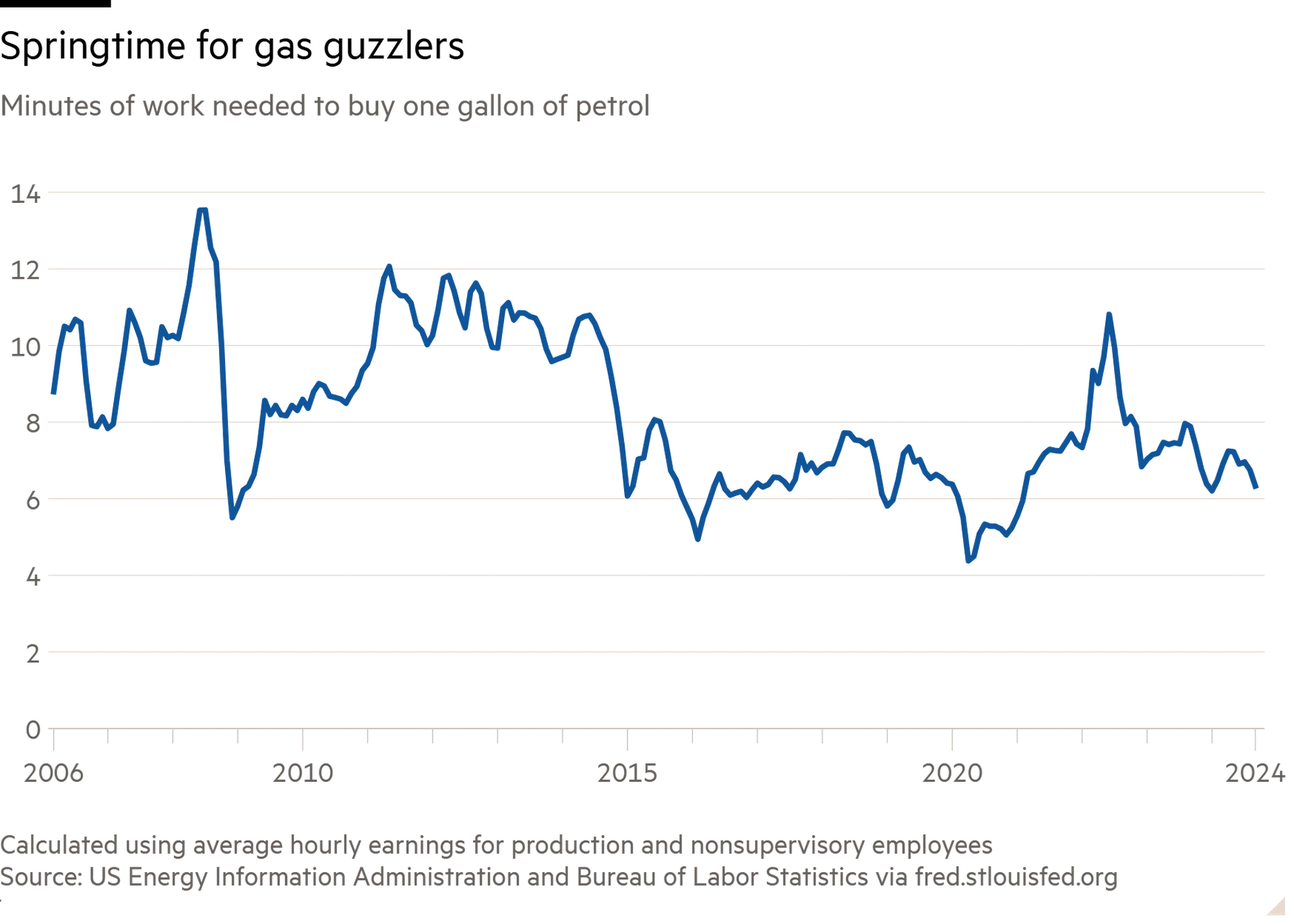尊敬的用戶您好,這是來自FT中文網的溫馨提示:如您對更多FT中文網的內容感興趣,請在蘋果應用商店或谷歌應用市場搜尋「FT中文網」,下載FT中文網的官方應用。
There are five days to go, but even the
best coverage of the US presidential election cannot give us any sense of which way things will go. If you believe the polls, the race is a dead heat. If you believe the so-called prediction models, Donald Trump is slightly more likely to win than Kamala Harris.
還有五天時間,但即使是
對美國總統大選最精彩的報導,也無法讓我們對局勢的走向有任何判斷。如果你相信民意調查,那麼選情將勢均力敵。如果你相信所謂的預測模型,唐納•川普(Donald Trump)獲勝的可能性略高於卡瑪拉•哈里斯(Kamala Harris)。
I believe neither. I decided to treat polls as uninformative after the 2022 midterm elections, where many people whose judgment on US politics I trust more than mine took the polls to show a “red wave”. It didn’t happen, and I have seen no totally convincing explanation as to why that would make me trust US political polls again. (
My own attempt to make sense of this concluded that not just abortion, but the economy counted in Democrats’ favour — on which more below.) The 2022 failure came on top of the poll misses in 2016 and 2020.
我兩者都不相信。2022年期中選舉後,我決定將民調視爲不具參考價值的資訊,因爲許多我比我更信任的人對美國政治的判斷認爲民調顯示會出現「紅色浪潮」。但這並沒有發生,我也沒有看到任何完全令人信服的解釋,能讓我再次相信美國的政治民調。2022年的失敗是在2016年和2020年民調失利的基礎上發生的。
Not that I’m less of a poll junkie than the next journalist. Polls are captivating in the way that another hit of your favourite drug is, as my colleague Oliver Roeder suggests in his
absolute must-read long read on polling in last weekend’s FT. And, of course,
pollsters have been thinking hard about how they may get closer to the actual result this time. But none of this makes me think it’s wise to think polls impart more information beyond the simple fact that we don’t know.
並不是說我比其他記者更不迷戀民意調查。正如我的同事奧利弗•羅德(Oliver Roeder)在上週末的英國《金融時報》上發表的
關於民調的必讀長篇文章中所說,民意調查就像你最喜歡的毒品一樣令人著迷。當然,民調機構一直在努力思考這次如何更接近實際結果。但這一切都沒有讓我覺得,除了「我們不知道」這一簡單事實之外,認爲民調還能傳遞更多資訊是明智的。
So-called prediction models are worse, because they claim to impart greater knowledge than polls, but they actually do the opposite. These models (such as
538’s and
The Economist’s) will tell you there is a certain probability that, say, Trump will win (52 per cent and 50 per cent at this time of writing, respectively). But a probability distribution is not a prediction — not in the case of a one-time event. Even a more lopsided probability does not “predict” either outcome; it says both are possible and at most that the modeller is more confident that one rather than the other will happen. A nearly 50-50 “prediction” says nothing at all — or nothing more than “we don’t know anything” about who will win in language pretending to say the opposite. (Don’t even get me started on betting markets . . . )
所謂的預測模型更糟糕,因爲它們聲稱比民意調查傳授更多的知識,但實際上卻恰恰相反。這些模型會告訴你,川普獲勝的機率是一定的
For something to count as a prediction, it has to be falsifiable, and probability distributions can’t be falsified by a single event. So in the case of the 2024 presidential election, look for those willing to give reasons why they make the falsifiable but definitive prediction that Trump wins, or Harris wins (or, conceivably but implausibly, neither).
要將某事視爲預測,它必須是可證僞的,而機率分佈無法透過單一事件來證僞。因此,在2024年總統大選中,尋找那些願意給出理由的人,解釋他們爲何做出川普獲勝或哈里斯獲勝(或者,可以想像但難以置信的是,兩者皆不)這一可證僞但明確的預測。
At this point, it’s entirely fair to ask what I predict. From everything I have said so far, I will happily admit that I don’t know anything about who will win. But over the course of many columns, I have made some intellectual commitments, which have implications for what I should think will happen if predict I must do. So it’s time to stick my neck out.
在這一點上,問我的預測是完全合理的。根據我迄今爲止所說的一切,我樂於承認我對誰會獲勝一無所知。然而,在許多專欄中,我已經做出了一些理智上的承諾,這些承諾會影響到我在必須做出預測時應該認爲會發生的事情。所以,現在是時候冒險一試了。
I predict that Harris will win, and by a solid margin. Why? Largely because I think “it’s still the economy, stupid” that determines the election — and because I think the strength of the US economy is more appreciated by US voters than the electoral polling picks up. (In addition, I think the abortion issue that helped Democrats outdo expectations two years ago is, if anything, stronger today.)
我預測哈里斯將獲勝,而且會以明顯的優勢獲勝。爲什麼?主要是因爲我認爲「決定選舉的仍然是經濟,傻瓜」,而且我認爲美國選民對美國經濟實力的認可程度要高於選舉民調所反映的。
The
puzzle around the mismatch between
strong economic outcomes (real wage growth, a strong job market, an industrial boom) and lack of support for the incumbent in electoral polling can be solved in two ways: questioning the economic data or the electoral poll results. Most observers have tried to find fault with the notion that the economy is good. For example, it’s easy to point out that while inflation has abated, prices are still a lot higher than before it took off; or that high interest rates weigh on many families’ prospects for buying a house. But there is an element of reverse engineering to this, seeking out the negatives that would explain the seeming lack of impact from a strong economy.
圍繞強勁的經濟成果(實際工資成長、強勁的就業市場、工業繁榮)與選舉民調中缺乏對現任者的支援之間的不匹配問題,可以透過兩種方式解決:質疑經濟數據或選舉民調結果。大多數觀察家都試圖質疑經濟良好的說法。例如,很容易指出,雖然通膨有所緩解,但物價仍然比通膨起飛前高出許多;或者高利率影響了許多家庭的購房前景。但這其中也有逆向工程的因素,即尋找負面因素來解釋爲何強勁的經濟似乎沒有產生影響。
So I find it more plausible to question the electoral polls. That is only partly because of polling’s recent failures. It’s also because a lot of voters actually do seem happy with the economy.
Properly adjusted for methodological changes, the Michigan consumer sentiment index has been on a clear upward trend since inflation peaked in the summer of 2022, and has reached levels similar to those four years ago. The
Conference Board’s measure of consumer confidence, too, has picked up fairly strongly.
因此,我認爲質疑選舉民調更有道理。這不僅僅是因爲民調最近的失敗,還因爲許多選民實際上似乎對經濟感到滿意。
經過適當的方法調整後,密西根消費者信心指數自2022年夏季通膨達到峯值以來一直呈現明顯的上升趨勢,並已達到與四年前相似的水準。世界大型企業聯合會(Conference Board)的消費者信心指數也有相當強勁的回升。
Alert readers might at this point rightly ask why I trust these surveys if I don’t trust the electoral polling. And I wouldn’t have a convincing answer — beyond pointing out that, unlike past electoral polls, sentiment surveys have largely tracked the economic reality, and returned the highest scores when labour markets have been strong, inflation low and real wages growing. I would also point to my colleague Robert Armstrong’s wonderful
write-up of his visit to the mall where he observed that whatever they may say, Americans consume as if times are good (their consumption powered another
strong quarter of growth in data released on Wednesday). And, above all, the facts speak for themselves, including those that have always been the most salient in US voter behaviour. Here is the petrol price — in nominal terms:
此時此刻,警覺的讀者可能會問,既然我不相信選舉民調,爲什麼還要相信這些調查呢?我沒有一個令人信服的答案,只能指出,與以往的選舉民調不同,情緒調查在很大程度上反映了經濟現實,並在勞動力市場強勁、通膨率低、實際工資成長時得分最高。我還想提到我的同事羅伯特•阿姆斯特朗(Robert Armstrong)
撰寫的一篇精彩文章,他在訪問購物中心時觀察到,無論他們怎麼說,美國人的消費行爲表明經濟狀況良好(在週三發佈的數據中,他們的消費推動了又一個季度的強勁成長)。最重要的是,事實勝於雄辯,包括那些在美國選民行爲中一直最爲突出的事實。以下是名義汽油價格:
And here it is expressed in terms of working hours it would take at an average wage to buy a gallon of petrol:
這裏用平均工資來計算購買一加侖汽油所需的工作時間:
There can, in other words, be little doubt that a lot of Americans are better off than four years ago. I hold on to the belief that this will in the end play out in the vote.
換句話說,幾乎可以肯定,許多美國人的生活比四年前要好。我堅信,這最終會在投票中體現出來。
Sketching this argument out to a colleague, I was asked if this isn’t wishful thinking. Which of course it is. But it is wishful thinking again linked to some specific intellectual commitments set out in the columns I have devoted to “Bidenomics”, the novel economic policy approach of President Joe Biden’s team, and similar economic arguments. As Nicholas Lemann writes in a
terrific piece in the New Yorker: “The irony of Bidenomics is the vast gulf between its scale — measured in money and in the number of projects that it has set in motion — and its political impact, which is essentially zero, even though a major part of its rationale is political.”
我向一位同事概述了這一論點,他問我這是不是一廂情願。這當然是一廂情願。但這又是一廂情願的想法,與我在「拜登經濟學」專欄中闡述的一些具體的思想承諾有關,這些專欄探討了喬•拜登(Joe Biden)總統團隊的新穎經濟政策方針,以及類似的經濟論點。正如尼古拉斯•萊曼(Nicholas Lemann)
在《紐約客》(New Yorker)雜誌上發表的一篇精彩文章中所寫:「拜登經濟學的諷刺之處在於其規模——以資金和已啓動項目的數量來衡量——與政治影響之間的巨大鴻溝,儘管其主要理論依據是政治性的,但政治影響基本上爲零。」
That rationale is one I have written supportively about since before Biden’s presidency. Indeed I wrote a
whole book about how a new “economics of belonging” is what it would take to draw voters away from illiberal and anti-democratic populism. So I
welcomed the big changes Biden presided over, and agree with how Lemann describes them today:
自拜登擔任總統之前,我就曾撰文支援這一觀點。事實上,我寫過
一本完整的書,論述新的「歸屬經濟學」如何能夠吸引選民遠離不自由和反民主的民粹主義。因此,我
對拜登主持的重大變革表示歡迎,並同意萊曼今天的描述:
Objectively, and improbably, he has passed more new domestic programs than any Democratic president since Lyndon Johnson — maybe even since Franklin Roosevelt . . . Biden passed domestic legislation that will generate government spending of at least five trillion dollars, spread across a wide range of purposes, in every corner of the country. He has also redirected many of the federal government’s regulatory agencies in ways that will profoundly affect American life . . . All of this doesn’t represent merely a hodgepodge of actions. There is as close to a unifying theory as one can find in a sweeping set of government policies. Almost all the discussion of “Bidenomics” — by focusing on short-term fluctuations of national metrics such as growth, the inflation rate, and unemployment, with the aim of determining the health of the economy — misses the point. Real Bidenomics upends a set of economic assumptions that have prevailed in both parties for most of the past half century. Biden is the first president in decades to treat government as the designer and ongoing referee of markets, rather than as the corrector of markets’ dislocations and excesses after the fact.
客觀地說,他透過的新國內項目比任何一位自林登•強森(Lyndon Johnson)以來的民主黨總統都要多,甚至可能比自富蘭克林•羅斯福(Franklin Roosevelt)以來的任何一位民主黨總統都要多。拜登透過的國內立法將導致至少五萬億美元的政府支出,這些支出分佈在全國各地,涉及廣泛的用途。他還重新調整了許多聯邦政府的監管機構,這將深刻影響美國人的生活。所有這些不僅僅是各種行動的雜燴。在一系列廣泛的政府政策中,可以找到最接近統一的理論。幾乎所有關於「拜登經濟學」的討論都忽略了一個重點,即關注經濟成長、通貨膨脹率和失業率等國家指標的短期波動,以判斷經濟健康狀況。真正的「拜登經濟學」顛覆了過去半個世紀以來兩黨普遍接受的一系列經濟假設。拜登是數十年來第一位將政府視爲市場的設計者和持續裁判者的總統,而不是事後糾正市場失調和過度的總統。
Wishful thinking, then, insofar as I have long argued that this sort of economics should bear political fruit. And wishful thinking in one other way: although it has been a while since I lived in the US, my more than a decade there still makes me believe that there are enough voters in enough states who find the spectacle of a new Trump presidency off-putting to secure a Harris victory. Tuesday will put my confidence to the test on both counts.
那麼,就我長期以來認爲這種經濟學應該結出政治果實而言,這是一廂情願的想法。另一方面,這也是一廂情願的想法:儘管我已經有一段時間沒有在美國生活了,但我在那裏的十多年經歷仍然讓我相信,在足夠多的州,有足夠多的選民會覺得川普再次當選總統的景象令人反感,從而確保哈里斯的勝利。星期二將考驗我在這兩方面的信心。
Other readables
其他可讀內容

